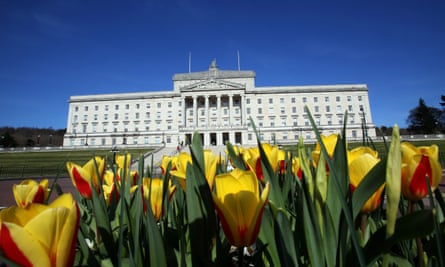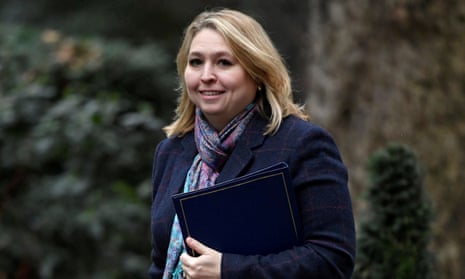The parliament building at Stormont is 365ft wide, representing one foot for each day of the year, but if she lasts in the job long enough it may also refer to the number of times Karen Bradley, Northern Ireland’s secretary of state, puts her foot in it.
Politicians in Northern Ireland have lost count, but agree she outdid herself last week by telling Westminster that security force killings during the Troubles were “not crimes” but the actions of people “fulfilling their duties in a dignified and appropriate way”.
Her subsequent apologies did not douse a clamour for her resignation. But few in Stormont think her departure would solve much. Northern Ireland has had no functioning elected government since power sharing between the Democratic Unionist party (DUP) and Sinn Féin collapsed in January 2017. Civil servants are left to run things but cannot make key decisions.
“If you’re on autopilot you know your speed, direction and destination and we know none of those things,” said Mike Nesbitt, an assembly member and former leader of the Ulster Unionist party (UUP). “What’s surprising to me is we’re a third year into the breakdown and the public doesn’t seem to care very much.”
Stormont, sited on an estate outside Belfast, looks formidable. A mile-long drive of red-twigged lime trees leads to an imposing building in the Greek classical style made of English Portland stone mounted on a granite base. Commissioned in 1922 for the newly formed state, it has six columns and six storeys, representing Northern Ireland’s six counties, plus ornate ceilings, chandeliers and marbled halls.
So much grandeur, wasted. The main chamber is mothballed, its benches empty. Some assembly members still work from their offices but on really quiet days, one member confided, it can feel like the Overlook hotel in The Shining.

“We’re at zombie level,” said Claire Hanna, of the Social Democratic and Labour party. “There’s a loss of belief that we can solve our own problems. The electorate has been conditioned to the idea that the place is ungovernable. Polarisation has never been more alive. The vacuum is delegitimising politics.”
Others use words such as “decay”, “diseased”, “putrid” and “farce” to describe a sour, sectarian mood of blaming everything on “them ’uns” on the other side.
The crisis has spectacularly bad timing. David Sterling, Northern Ireland’s chief civil servant, warned last week of a no-deal Brexit’s potentially “grave” and “profound” consequences, including a sharp rise in unemployment, the collapse or flight of businesses, and unrest.
The prospect of a hard border and the fact Northern Ireland voted in vain to stay in the European Union has alienated nationalists and some moderate unionists, prompting Sinn Féin to push for a referendum on a united Ireland. Dissident republicans sense a historic opportunity. Catholics are expected to outnumber Protestants within five years.
Analysts say the sharpening of identity politics, Irishness versus Britishness, is an ominous reversal for the 1998 Good Friday agreement which brokered peace and helped both identities feel at home in Northern Ireland.
“Brexit has been framed through national identity, sovereignty and the border so it’s difficult for nationalists and unionists to find common ground,” Katy Hayward, a sociologist at Queen’s University, said on the sidelines of a Brexit conference at NUI Galway. “The middle ground is wearing away. You’re adding fuel to the fire of those who want the peace process to collapse.”
Compounding the challenge is a toxic mix of pettiness, resentment, scandal, history and parliamentary arithmetic.
Sinn Féin quit Stormont because under Arlene Foster the DUP betrayed promises, such as an Irish language act, and sought to humiliate nationalists, said Danny Morrison, the party’s former publicity director. “Our people were telling us: ‘Get out.’ Since then our vote has gone up.”
A public inquiry into a bungled green energy scheme known as cash for ash has exposed sleaze and dysfunction in the civil service and DUP leadership, prompting speculation about Foster’s future.
The DUP blames the collapse of power sharing on Sinn Féin, saying the party wants instability to portray Northern Ireland as a failed state.
Business and farming leaders say the DUP is doing the endangering, by nudging the UK towards a hard Brexit in defiance of economic sense and public sentiment.
Disputes over the investigation of killings during the Troubles, so-called legacy cases, haunt all sides and embolden militants.
Theresa May’s decision to call an election in 2017 further complicated things by leaving the Conservative government dependent on the DUP’s 10 MPs, compromising the neutrality of any secretary of state.
A cauldron of grievances and mistrust, a society grappling with historical and existential choices, a party wielding unprecedented leverage – restoring devolution in this climate called for a political wizard, someone with the focus, wile and perseverance to conjure a new beginning.
Enter Karen Bradley.
By her own admission the MP for Staffordshire Moorlands arrived in Northern Ireland in January 2018 “slightly scared” and profoundly ignorant, unaware even that nationalists did not vote for unionists and vice versa.
People who have dealt with her say the learning curve remained flat. “She’s a lovely person but just doesn’t do her homework,” said one. “Little more than an ability to smile and remain cheerful while surrounded by calamity,” said the Irish News.
Officials defend her record. Hospitals, schools and other sectors are fraying but still functioning, budgets are still being passed, the five main parties have been herded into sporadic talks.
Analysts say fixing Northern Ireland’s broken politics will require a lot more: a soft Brexit, institutional reform and rebuilding trust. Few are optimistic.
Not everyone shares the gloom. Peter Weir, a DUP assembly member and former education minister, played down the prospect of economic carnage, a referendum on Irish unification or a surge in dissident republican violence.
After 1998 Stormont was a rollercoaster of crises, never fully derailing, he said. “No matter how bad things are there is a certain gravitational pull towards a solution.”
